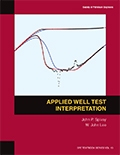John Lee, Professor and Hugh Roy and Lillie Cranz Cullen Distinguished University Chair in the Cullen College of Engineering’s petroleum engineering program, is unquestionably one of the giants of the petroleum engineering field. Among his many accomplishments are three best-selling textbooks published by the Society of Petroleum Engineers.
In December, the SPE added to its catalog a fourth book by Lee, written with senior author John Spivey.
"Applied Well Test Interpretation" focuses on using tests of petroleum wells to determine the important properties affecting flow in a reservoir.
The main test the book covers is pressure transient response. To take this measurement, well operators change the amount of petroleum a well produces (often shutting it down to zero) and then measure how the pressure at the bottom of the well changes over time. “If the pressure changes rapidly to a final, stabilized value, that means the reservoir is able to transmit fluids very rapidly; that’s good. If it changes very slowly to that final pressure, then the reservoir is not capable of transmitting signals rapidly and that’s bad,” said Lee.
In addition to covering the application of pressure transient response, the book also presents the theories behind rate transient testing, which uses the amount of petroleum produced by a well over a period of time to determine the reservoir’s important properties.
Since pressure in unconventional wells builds up too slowly to conduct pressure transient response tests, rate transient testing is an important tool for forecasting unconventional reservoirs, Lee said. Applied rate transient testing will be covered in a future book, he added.
This is the first of Lee’s textbooks in which he serves as a secondary author. The lead author, Spivey, is a petroleum engineering consultant based in College Station, Texas who earned his Ph.D. under Lee.
This is very much by design, said Lee. Two of Lee’s three other SPE-published books cover well testing and interpretation. By having Spivey take the lead on this text, Lee said he is beginning to handoff the series to Spivey for the many years ahead.
